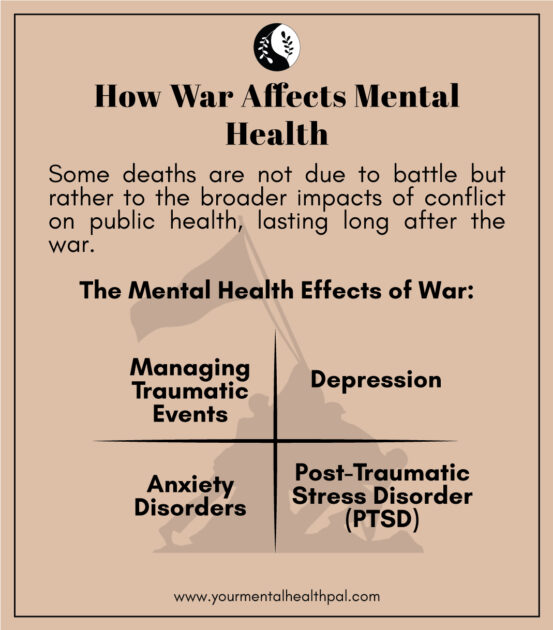So far, civilians have died in the conflict in Ukraine, according to the UN human rights office. The deaths have happened due to the fighting, but the war affects mental health and impacts people’s mental health beyond bullets and bombs.
Some deaths are not due to battle but rather to the broader impacts of conflict on public health, lasting long after the war.
The Russian invasion of Ukraine will almost certainly result in widespread pain and health problems among the civilian population.
The Mental Health Effects On War

War is more than just a military war; it can cause various health problems, including mental health problems. The psychological impact of war may be so profound that it is critical to discuss suffering from war trauma.
War leaves endless war effects on mental health in practically everyone, regardless of age or gender. Here are the results of the war on mental health-
Consequences of war and the war affects on mental health-
1. Managing Traumatic Events
A traumatic incident is a stunning, frightening, or dangerous occurrence that can emotionally and physically impact someone. Natural disasters (such as hurricanes, earthquakes, and floods), acts of violence (including assault, abuse, terrorist attacks, and mass shootings), vehicle accidents, and other accidents can all be traumatic.
Following a stressful experience, researchers look into the elements that help people cope or raise their chance of developing other physical or mental health problems.
Individuals with a mental health issue or who have previously experienced traumatic events are constantly stressed or lack support from friends and family are more prone to develop more severe symptoms and require more assistance.
Some people turn to alcohol or other substances to cope with their symptoms. Although substance abuse may momentarily alleviate symptoms, it can also lead to new problems and obstruct rehabilitation.
2. Post-Traumatic Stress Disorder (PTSD)
Post-traumatic stress disorder (PTSD) is a disorder that affects certain people after they have been through a traumatic, frightening, or hazardous incident.
It’s normal to be scared during and after a terrible event. Fear causes a slew of split-second changes in the body to defend against or avoid harm. This “fight-or-flight” response is a common one designed to keep a person safe. After a traumatic event, nearly everyone will have a variety of reactions, but the majority of people will heal spontaneously from the initial symptoms.
Those who continue to have problems may be diagnosed with post-traumatic stress disorder (PTSD). Even when they are not in danger, people with PTSD may feel tense or afraid.
PTSD may strike anyone at any age. It includes military veterans, children, and victims of physical or sexual assault, abuse, accidents, disasters, or other traumatic occurrences.
According to the National Center for PTSD, around 7 to 8 people out of every 100 will have PTSD at some point in their lives. Women are more likely than men to get PTSD, and some people may be predisposed to it due to genetics.
3. Anxiety Disorders
Anxiety is something that everyone experiences from time to time. When confronted with an issue at work, before taking a test, or before making a significant decision, you may experience anxiety.
On the other hand, anxiety disorders are more than transitory anxiety or terror. Anxiety does not go away in those with anxiety disorders, and it can worsen with time. Symptoms might make it challenging to do work, schoolwork, and maintain relationships.
Anxiety disorders include generalized anxiety disorder, panic disorder, and numerous phobia-related disorders.
Frequent, unexpected panic attacks characterize the panic disorder. Panic attacks are brief bursts of acute terror that begin suddenly and peak within minutes. Attacks can happen out of nowhere or due to a trigger, such as a dreaded object or circumstance.
4. Depression
Depression (sometimes known as clinical depression or severe depressive disorder) is a common but significant mood illness. It creates severe symptoms that impact how you feel, think, and cope with daily tasks like sleeping, eating, and working. The symptoms of depression must be present for at least two weeks to be identified.
In the United States, depression is one of the most frequent mental illnesses. Depression is thought to be caused by a combination of genetic, biological, environmental, and psychological factors.
Depression can strike at any age, but it is more common in adults. Depression is now recognized as a condition that affects children and adolescents, albeit irritation rather than a poor mood sometimes accompanies it. Many chronic mood and anxiety problems in adults start in childhood with high anxiety levels.
Conclusion
Both fighters and non-combatants suffer physical and mental consequences due to war.
Wars will almost certainly continue to inflict damage on people’s emotions. More empirical research on healing, developing resilience, and including cultural capacity builders are needed to provide adequate and effective mental health services to future war affects mental health and its victims.
Make peace, not war, read more on mental health and stay connected with your 24×7 virtual pal.

